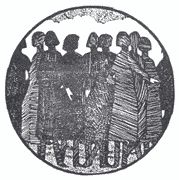EDITORIAL Secretary of State Consultation: A Note on Process by Joan Brown Hicks On June 26, 1986, representatives from over fifty women's groups receiving funding from the Women's Program of the Secretary of State met with then Secretary of State Benoit Bouchard, to discuss our concerns about funding. We hope to print a full report on the consultation in the next issue of WOMEN'S EDUCATION DES FEMMES (WEDF). In this issue, we present the preamble, which outlines historically the commitments of the government to women, given at the consultation. In January, 1986, CCLOW Executive Director Aisla Thomson and I met with staff of the Women's Program as part of our ongoing liaison. It was agreed that annual consultations between Program staff and women's groups should be renewed. We also felt that Mr. Bouchard, who had taken his cabinet post only five months earlier, should have the chance to get an overview of the concerns of the women's groups who received funding from his department. We discussed the idea with Melody Tomka, the Minister's Special Advisor on Women, and also encouraged other women's groups to write in support of the meeting. Mr. Bouchard assured us in March that a spring consultation would be supported. But the federal freeze on discretionary spending made dates and numbers uncertain: it was not until mid April that we were given the official go--ahead. It was not easy to organize the consultation: we had two months to pull together an event representing hundreds of groups across the country. I would like to give a little background on the process leading up to it. With input from Women's Program staff, a Planning Committee was formed, consisting of representatives from Relais-femmes, Women's Health sharing, Fédération des femmes du Quebec, the Women's Research Centre, the Canadian Research Institute for the Advancement of Women, the National Action Committee of the Status of Women (NAC) and CCLOW. At its first meeting, May 1-2 in Toronto, the committee developed an outline of the consultation: one day of meetings among women's group representatives, one day of meetings with the Minister and Women's Program staff, and one day of follow-up and evaluation. Drawing up criteria for inviting groups to the consultation was our first concern. Hundreds of groups depend on the Women's Program for funding. Even one representative from each would be logistically and financially impossible. But we felt that groups invited to the consultation must be representative of all groups receiving funding. It was decided to invite: groups receiving funds from the Hull office of Women's Program, and Quebec groups; major women's groups representing native, black, immigrant or disabled women; and major women's groups representing regional concerns. Each group could send only one representative. By the time of the second meeting, held to arrange detailed planning, rumors of impending cuts to the Women's Program budget were rife and groups were experiencing delays in payments. It was clear that the consultation had become an emergency meeting. Once more, we had to justify our limited funding; we had to defend the modest gains in federal commitment to women's issues over the last decade. On short notice, Madeleine Parent of NAC was delegated to prepare a position paper (the Preamble), with input from committee members, especially Marie Letellier of Relais-femmes and Aisla Thomson. The Committee prepared an invitation list, and scrambled to find meeting dates before the House rose for the summer. After some negotiation, the Women's Program gave the committee a grant to organize the consultation. We passed the nitty-gritty work--plane, train and hotel bookings, meals, translations, support staff, displays--on to Convergence, an Ottawa-based feminist consulting group. There was less than a month to go. Somehow Convergence managed to pull it all together, for which they have our undying admiration and thanks. Considering the haste with which the meeting was arranged, it was astonishing how smoothly it went. The first day combined plenary sessions (which I cochaired with Ginette Busque, President of Federation des femmes du Quebec) with workshops to plan the meetings with members of parliament and ministerial staff. It was an exhilarating three days. In general, we were angry at being told that the Women's Program
was only being cut by 5%. The consultation was nonetheless important. We
were able to present our position not only to Mr. Bouchard, but to Members of
Parliament, in a "show and tell" session. Perhaps equally rewarding was the
chance to bring together women from many groups to share our common interests.
We found that we were strong, committed and united in our aspirations. CCLOW
can feel proud of its part in bringing about the meeting.
Three days later, the Prime Minister announced a cabinet shuffle. The Planning Committee, which has continued to meet via teleconference calls, is seeking a meeting with the new Secretary of State, David Crombie. We will also try to arrange a meeting with Barbara MacDougall, the Minister Responsible for the Status of Women. Who knows - maybe the consultation will bear fruit in an awareness of the concerns of women on the part of the new Employment Minister - Benoît Bouchard. |
| Back | Contents | Next |
